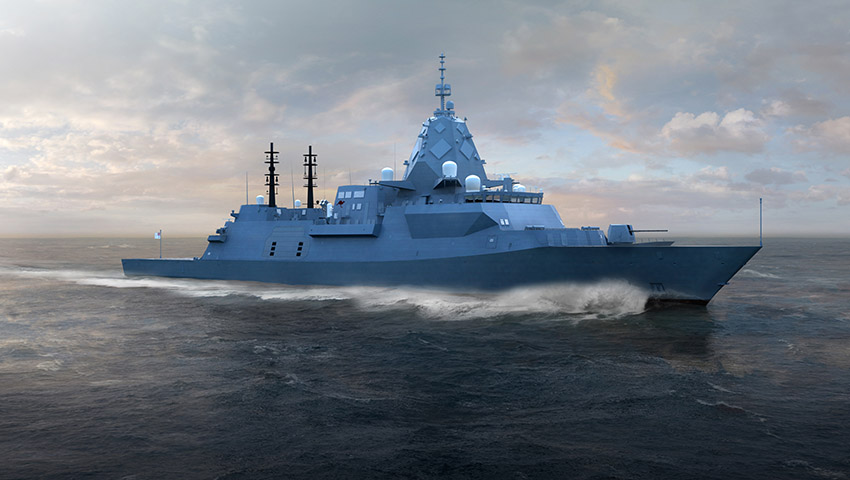The US Department of State and Defense Security Cooperation Agency (DSCA) has approved a potential US$1.5 billion ($2.1 billion) contract to modernise the Hobart Class destroyers and for the first thee Hunter Class frigates.
To continue reading the rest of this article, please log in.
Create free account to get unlimited news articles and more!
The State Department has made a determination approving a possible Foreign Military Sale to Australia of long lead items, engineering development activities, and other defence services to support the Australian Surface Combatant Program for an estimated cost of US$1.5 billion ($2.1 billion).
The Defense Security Cooperation Agency (DSCA) delivered the required certification notifying Congress of this possible sale yesterday.
As part of the Commonwealth's material request, DSCA will provide for long lead items, engineering development activities, and other defence services to support the Australian Surface Combatant Program, including the modernisation of the three Hobart Class destroyers, and construction of the first three (of nine total) Hunter Class frigates.
The proposed sale will enhance Australia's Surface Combatant capability by modernising their existing three AEGIS capable Hobart Class Destroyers with the latest technology and capability, and delivering the first three (of nine) Aegis capable Hunter Class Future Frigates.
This sale enhances Australia's self-defence capability, while significantly improving interoperability with US Navy AEGIS combatants in the region. By deploying a surface combatant fleet that will incorporate Cooperative Engagement Capability (CEC), Australia will significantly improve network-centric warfare capability for US forces operating in the region.
The DSCA notice states, "This proposed sale will support the foreign policy and national security objectives of the United States. Australia is one of our most important allies in the Western Pacific. The strategic location of this political and economic power contributes significantly to ensuring peace and economic stability in the region."
The deal will also include:
- three ship sets of the Aegis Weapon System (AWS) in the MK 6 Mod 1 configuration to support the modernisation of the Hobart Class DDGs;
- three ship sets of the AWS in the MK 6 Mod 1 configuration to support the New Construction of the Hunter Class FFGs;
- three ship sets of the MK 41 Vertical Launching Systems (VLS) for installation on the Hunter Class Frigates;
- three ship sets (2 mounts per ship) of the Close-In Weapons System (CIWS) for installation on the Hunter Class frigates;
- two Australia Aegis Weapon System Computer Programs (one for Hobart Class, one for Hunter Class), and associated computer programs for AEGIS Combat System components for installation on both the Hobart and Hunter Class ships;
- six ship sets of upgraded CEC equipment for installation on the Hobart and Hunter Class ships;
- six ship sets of Command and Control Processor (C2P) equipment for installation on the Hobart and Hunter Class ships; and
- eight ship sets of Multifunctional Information Distribution System Joint Tactical Radio Set (MIDS JTRS) terminals for installation on the Hobart and Hunter Class ships.
Additionally, the deal will include:
- three ship sets of MK 34 Gun Weapon System (GWS) modification equipment to include the Electro Optical Sight System and changes supporting Naval Fires Planner and associated TacLink Control System for installation on the Hobart Class Destroyers;
- three ship sets of MK 34 Gun Weapon System components to include the MK 160 Gun Computing System and the MK 20 Electro Optical Sight System, and the Naval Fires Planner and associated TacLink Control System for installation on the Hunter Class frigates;
- three ship sets of: Mode 5/S capable Identification, Friend of Foe (IFF) Systems; Gigabit Ethernet Data Multiplexing System (GEDMS);
- AN/WSN-7 Ring Laser Gyrocompass Inertial Navigation Systems; WSN-9 Digital Hybrid Speed Log systems;
- Common Data Link Management System (CDLMS); and Global Command and Control System-Maritime (GCCS-M) systems for installation on the Hunter Class frigates; and
- six ship sets of AN/SRQ-4 Hawklink and SQQ-89 Sonobuoy processing equipment for installation on the Hobart and Hunter Class ships.
Notably, the modernisation will see a "capability upgrade for the installed Aegis Combat System on the Hobart Class destroyer, including Integrated Air and Missile Defense capability and growth capability for Ballistic Missile Defense".
A key component of supporting this includes development, integration and testing support for installation of a Aegis Combat System for installation on the Hunter Class FFG, a Global Combat Ship Type 26 platform, including the integration of the indigenous CEAFAR 2 Phased Array Radar with the Aegis combat system (including CEC) and the primary radar sensor and illuminator.
"Integration of selected Australian provided combat system components including undersea warfare and ship self defence for installation on the Hobart and Hunter Class ships; integration of the MH-60R helicopter into the Aegis Combat System for installation on the Hobart and Hunter Class ships."
"Australia will have no difficulty absorbing this equipment into its armed forces. The proposed sale of this equipment and support will not alter the basic military balance in the region," DSCA stated.
There are a significant number of companies under contract with the US Navy that will provide components and systems as well as engineering services during the execution of this effort, with a significant portion of the effort to be performed by Lockheed Martin Rotary and Mission Systems.
Stephen Kuper
Steve has an extensive career across government, defence industry and advocacy, having previously worked for cabinet ministers at both Federal and State levels.

 Login
Login








